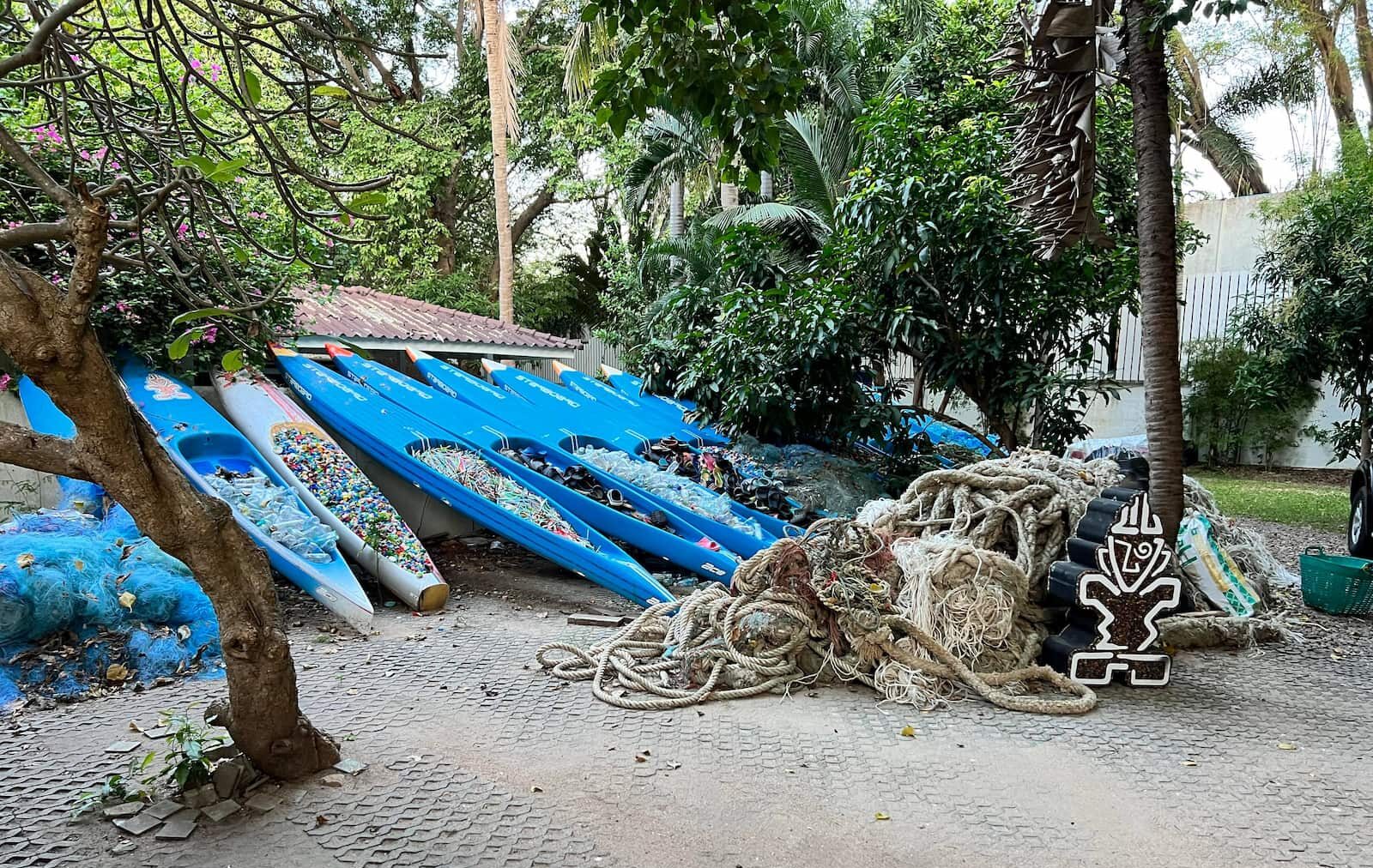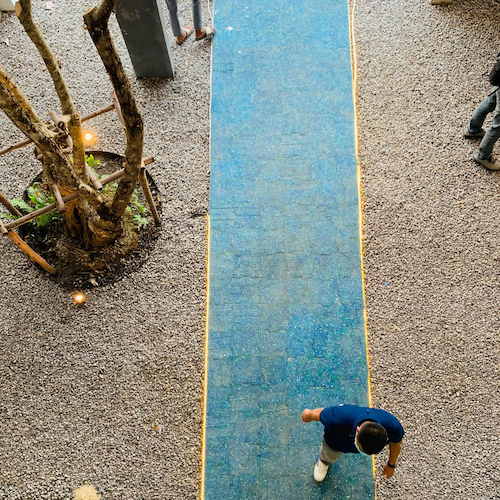Starboard currently use 5 different recycling sites in Thailand for our Plastic Offset Program and are working towards recycling solutions in Myanmar.
Through our Plastic Offset Program, we collect more than 100 000 kg of plastic a year in Thailand & Myanmar. But what happens to the waste once it has been collected?
After all cleanups, we sort the waste into different categories, with the goal of recycling as much as possible. In Thailand anything we can’t recycle, either because it is too contaminated, or because there is no recycling option available yet, goes to TPIPP waste-to-energy plant.
In Myanmar we currently working with Prevent Plastics Myanmar to find facilities to recycle fishing nets, ropes and plastic bottles, cans and glass bottles.
Our recycling sites in Thailand
- PET bottles, glass and aluminium cans go to Arpu Recycling
- Plastic bags and PE film through Veolia.
- Nylon Fishing nets and PP rope through EJF + Teamplas Factory.
- Bottle Caps in Starboard HQ in our precious plastic machine.
- Flip flops, lighters and glass bottles through Trash Hero Pattani…
Trash Hero Pattani Recycling Projects
Trash Hero Pattani work with a local University of clean beaches, recycle waste, and run childrens education programs. Check out some of the projects they are working on below:
1. Glass bottles back into Sand.
Trash Hero Pattani uses the sand as an educational tool, teaching hundreds of children about environmental challenges and solutions. Many people don’t know that glass is made of sand, or plastic from oil. Trash Hero helps visualise the up- and down-cycle parts of products, products that today are way too easy to access without any second thoughts.
2. From old to new flip flops.
This initiative is a collaboration between Trash Hero Pattani and Tlejourn. Read more on Tlejourn’s website. When we send the slippers we collect from the beach they can be made into new ones!
3. Lighters to house decoration and terrazzo.
Trash Hero Pattani are ever-creative, finding new ways to give life to waste, and at the same time engaging the local children.
4. Flip flops to walkway and wall decorations
Using plastic as decoration is a great way to create awareness whilst reusing the waste.
Starboard HQ Recycling Project
Recycling bottle caps into medals in our precious plastic machine
We recycle our collected bottle caps through our Precious Plastic Machine, using the medals as awards, for example at Årens Dag this summer. Furthermore, we use the machine and medals as education tools for children and organisations.
Our POP team recycling
Offsetting our plastic footprint is not a plastic solution. Although, it is a great way of creating livelihoods for people in need of it as well as cleaning up beaches that will not be cleaned.
Our POP focus on cleaning areas where local waste management does not suffice. In other words, we work with collecting waste that would otherwise end up in the ocean.
About Recycling
Recycling Plastic
While recycling is currently the best solution we have for dealing with the beach and ocean plastic we collect, it isn’t perfect.
Some of the Problems with Recycling Plastics:
- Effectively used for greenwashing
- An excuse to make more plastic
- Note: The production and accumulation of plastic are still growing exponentially, and will more than double from today until 2050.
- All plastics can only be recycled a set number of times
- Only 2% of plastic used is properly recycled
- Around 24% of plastic used gets downcycled
- The process releases toxins and CO2
Some perks with Recycling Plastics
- It is better than ending up in landfills or being incinerated right away.
- If not dealt with, the plastic will stay in nature for several hundred years.
- It creates livelihoods.
- Several of the recycling projects above are used as education for children.
- The few cases where recycled plastic can replace “necessary” virgin material, it is great.
Some materials can be recycled endlessly
On the other hand, recycling can be a very good solution for some materials. Glass and aluminium, for example, can be recycled endlessly without losing quality. Hence, if we stopped increasing our demand for these materials and started effectively recycling them, we could in theory stop extracting raw materials. NB: it will still release greenhouse gases in the prosses. Few things produced are really sustainable.
Endlessly
- Glass
- Aluminium Can
Limited (all plastics)
- Sandle/EVA pad
- Plastic bag
- PET bottle
- Lighter
- Bottle Cap
- Nylon Fishing net
- PP rope
- PE Film
Non-recyclable material
- Straws/cutlery
- Fabric
- EPS
- Note- industrial EPS is recyclable, but we have not yet been able to find a recycling site that accepts dirty, contaminated EPS from the beach
- Rubber Tires
- Note- currently looking on an option here
Choosing recycling sites
We aim for our Plastic Offset Program to be a zero landfill project. recycling as much of the waste as possible. When choosing recycling sites, we take several considerations.
- We search for efficient, environmentally friendly recycling options.
- We want the recycling sites to be close to our collecting sites, avoiding unnecessary transport.
This is relevant now, as we are expanding our POP throughout South East Asia, continuously searching for suitable solutions for the plastics collected.
About waste to energy
Unfortunately, we collect a big amount of non-recyclable materials. These include composite plastic waste such as diapers, toys or lighters, and heavily contaminated waste. For non-recyclable materials, the two most obvious options are Landfill and Waste to Energy. There are disagreements on which of these alternatives is the lesser of two evils. Some of the arguments go as follows:
- Landfills pile up, will be impossible as a long-term solution, and releases microplastics and greenhouse gases.
- Waste to Energy generates horrible toxins in form of waste gases entering the air.
For our waste, we have analysed the options available and chosen waste-to-energy through TPIPP as the best option. Particularly as TPIPP have filter processes that prevent most toxic gases from entering the air.
Other Recycling Projects for Starboard Products
- Recycle IQFoil masts into SUP fins.
- We are part of a collaboration working on the project Carbon Fibre Circular Alliance, recycling old IQFoil masts into SUP fins. Read more about the project.
- Recycled Fins
- All of our fins are net zero.
- Recycled board bags from PET Bottles
- Both composite and inflatable board bags are made using upcycled PET material from Waste2Wear! These ultra-strong board bags have half the carbon footprint of virgin material and utilize an average of 14 plastic bottles per board bag.
Our fight against Single-used Plastic
- Every year we calculate our plastic footprint in a public report.
- Combined with the POP, we work against plastic waste by developing our products to be the best in and for the world.
- Moreover, we minimize our plastic waste overall, with zero plastic in our packaging and a single-use plastic ban in our office.








































